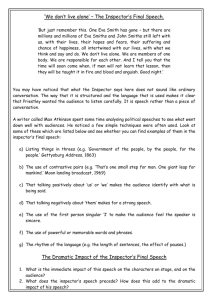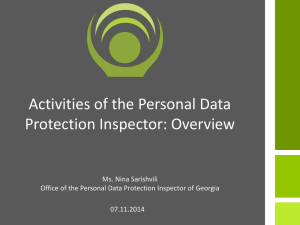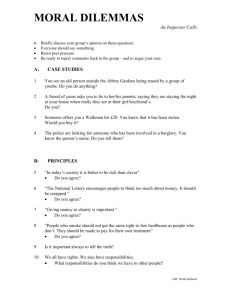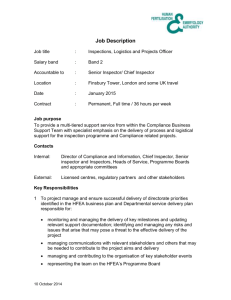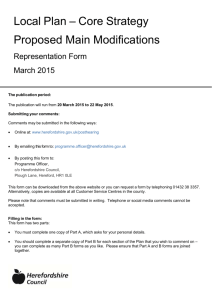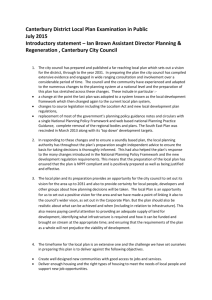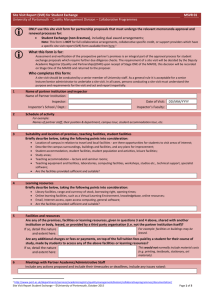LEICESTERSHIRE WASTE AND MINERALS DPDs
advertisement
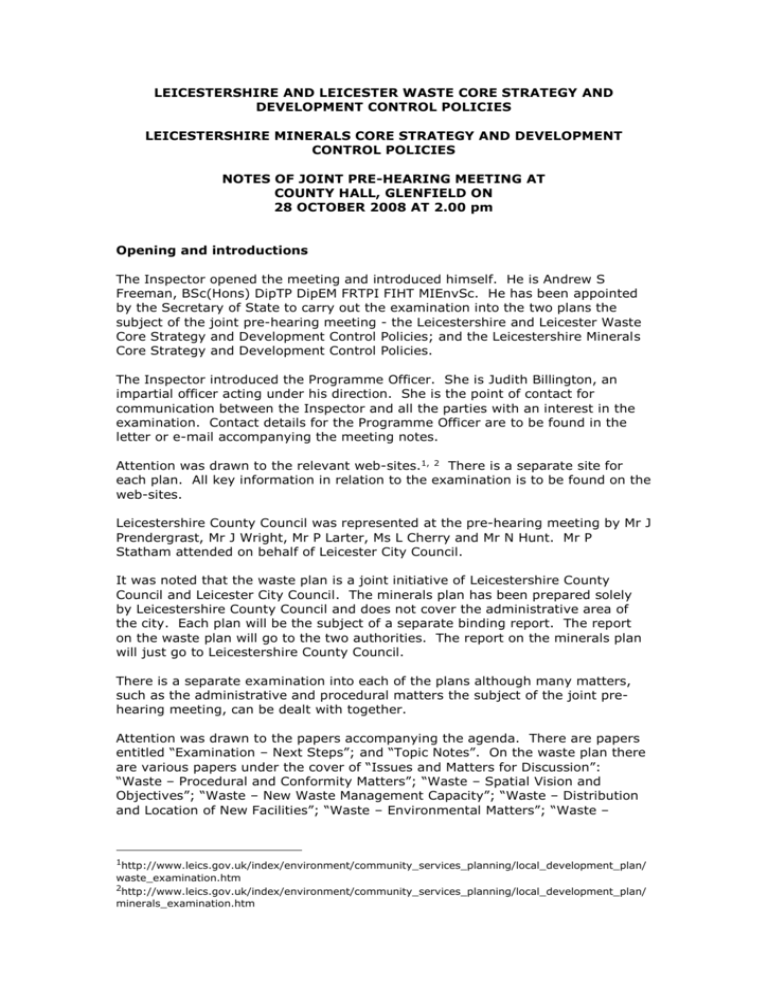
LEICESTERSHIRE AND LEICESTER WASTE CORE STRATEGY AND DEVELOPMENT CONTROL POLICIES LEICESTERSHIRE MINERALS CORE STRATEGY AND DEVELOPMENT CONTROL POLICIES NOTES OF JOINT PRE-HEARING MEETING AT COUNTY HALL, GLENFIELD ON 28 OCTOBER 2008 AT 2.00 pm Opening and introductions The Inspector opened the meeting and introduced himself. He is Andrew S Freeman, BSc(Hons) DipTP DipEM FRTPI FIHT MIEnvSc. He has been appointed by the Secretary of State to carry out the examination into the two plans the subject of the joint pre-hearing meeting - the Leicestershire and Leicester Waste Core Strategy and Development Control Policies; and the Leicestershire Minerals Core Strategy and Development Control Policies. The Inspector introduced the Programme Officer. She is Judith Billington, an impartial officer acting under his direction. She is the point of contact for communication between the Inspector and all the parties with an interest in the examination. Contact details for the Programme Officer are to be found in the letter or e-mail accompanying the meeting notes. Attention was drawn to the relevant web-sites.1, 2 There is a separate site for each plan. All key information in relation to the examination is to be found on the web-sites. Leicestershire County Council was represented at the pre-hearing meeting by Mr J Prendergrast, Mr J Wright, Mr P Larter, Ms L Cherry and Mr N Hunt. Mr P Statham attended on behalf of Leicester City Council. It was noted that the waste plan is a joint initiative of Leicestershire County Council and Leicester City Council. The minerals plan has been prepared solely by Leicestershire County Council and does not cover the administrative area of the city. Each plan will be the subject of a separate binding report. The report on the waste plan will go to the two authorities. The report on the minerals plan will just go to Leicestershire County Council. There is a separate examination into each of the plans although many matters, such as the administrative and procedural matters the subject of the joint prehearing meeting, can be dealt with together. Attention was drawn to the papers accompanying the agenda. There are papers entitled “Examination – Next Steps”; and “Topic Notes”. On the waste plan there are various papers under the cover of “Issues and Matters for Discussion”: “Waste – Procedural and Conformity Matters”; “Waste – Spatial Vision and Objectives”; “Waste – New Waste Management Capacity”; “Waste – Distribution and Location of New Facilities”; “Waste – Environmental Matters”; “Waste – 1 http://www.leics.gov.uk/index/environment/community_services_planning/local_development_plan/ waste_examination.htm 2 http://www.leics.gov.uk/index/environment/community_services_planning/local_development_plan/ minerals_examination.htm Development Control Policies”; “Waste – Monitoring”; and “Waste – Miscellaneous Points”. There’s also a “Hearing Sessions – Draft Programme” on waste. On minerals, and again under the cover of “Issues and Matters for Discussion”, there are papers on “Minerals – Procedural and Conformity Matters”; “Minerals – Spatial Vision and Objectives”; “Minerals – Introductory, Background and Key Diagram Points”; “Minerals – Supply other that Aggregates”; “Minerals – Supply: General Matters and Aggregates”; “Minerals – Environmental Matters”; “Minerals – Development Control Policies”; “Minerals – Monitoring”; and a “Hearing Sessions - Draft Programme” on the minerals hearings. Attendees were asked to obtain copies from the Programme Officer if they were missing any of the documents mentioned. Purpose of the pre-hearing meeting The pre-hearing meeting covered both the waste and minerals plans. However, only procedural and administrative matters were discussed. There was no discussion of the content or merits of the plans or on the individual representations. The Inspector explained the examination process and the key steps in that process; what further documentation he might need from participants in the coming weeks and months; how there will be detailed probing of the plans and the key representations through a series of hearing sessions in the New Year; and how everything will be brought together in a binding report on each plan. Role of the Programme Officer The Inspector expanded on the role of the Programme Officer. She is the first point of contact in relation to everything to do with the examination. Amongst her principal tasks are: Assisting the Inspector with procedural and administrative matters; Maintaining the examination library - including copies of documents that comprise the evidence base for the two plans; other core documents; and copies of submissions to the hearing sessions; Receiving, recording and circulating as necessary material relevant to the examination; Organising the programme of hearings; and Generally making sure that everything necessary is received and circulated on time. She will advise on programming and procedural matters; and any matters which the Council or other participants want to raise with the Inspector should be channelled through the Programme Officer. He will do likewise by way of communication with the parties. This is to ensure his independence at all times. There is a period when the Programme Officer will be away – between 4 November 2008 and 27 December 2008. During that period Dawn MacLeod will stand in for her. The contact details remain the same. Scope of the Examination and the role of the Inspector The interdependent examination started at the time of submission of the plans to the Secretary of State and will finish upon the submission of the Inspector’s reports to the councils. The broad purpose of the examination is two-fold. First, the Inspector has to determine whether all the necessary legal requirements have been met – whether, in drawing up and progressing the plans, the various requirements of the Planning and Compulsory Purchase Act 2004 and the related development plan regulations have been met. It was noted that the regulations have recently been amended; but the plans were submitted before the amendments came into force. They will be progressed under the original un-amended regulations. The Inspector’s second main task is to determine whether the plans are sound. The tests of soundness are now set out in the June 2008 edition of Planning Policy Statement 12 on Local Spatial Planning published just before submission of the plans. Under transitional arrangements, the June 2008 soundness tests are the tests that the Inspector will be applying, not the former test as set out in the original version of PPS 12. It was noted that, in reality, there is not a lot of difference in that the new PPS 12 tends to consolidate the original tests into three overarching tests of soundness. Insofar as those making representations identified criteria in the old regime under which they considered the plans to be either sound or unsound, the Inspector will see which of the new tests refer and apply the appropriate tests accordingly. To be sound, the plans have to be justified, effective and consistent with national policy. Those are the three new tests. Justified means that the document must be: Founded on a robust and credible evidence base; and The most appropriate strategy when considered against the reasonable alternatives. Effective means that the document must be: Deliverable; flexible; and able to be monitored. These concepts are expanded upon in Paragraphs 4.36 – 4.38 and 4.44 – 4.47 of PPS 12; and this should be the first port of call in unravelling the mystery of what soundness is all about. The Inspector drew attention to other guidance that might be of help: Planning Policy Statement PPS 12 – creating strong safe and prosperous communities through Local Spatial Planning [DCLG, June 2008] Plan-making Manual (on line at www.pas.uk/planmakingmanual) Then there are a couple of documents that can be found on The Planning Inspectorate’s web site (www.planning-inspectorate.gov.uk/pins/index.htm) by following the link to Local Development Frameworks: Examining Development Plan Documents: Soundness Guidance [The Planning Inspectorate, July 2008] Lessons Learned Examining Development Plan Documents [The Planning Inspectorate, June 2007] In addition, the following are also relevant: Planning & Compulsory Purchase Act 2004 and the Town and Country Planning (Local Development)(England) Regulations 2004 Planning Policy Statement PPS 10 – Planning for Sustainable Waste Management [ODPM] and the accompanying Companion Guide to PPS 10 [DCLG] Minerals Policy Statement MPS 1 – Planning & Minerals and the accompanying Practice Guide [DCLG, November 2006] Procedural questions for the WPAs / MPA The Inspector noted that his first broad task is to see whether all the necessary legal requirements have been met. He has already sent through to the Council a legal compliance checklist. He will also have hearings, in the sessions on both the waste and the minerals plans, into procedural and conformity matters. However, he wanted to avoid any legal or procedural hiccup or delay. He asked specifically about the matters highlighted in PPS 12: Have the plans been prepared in accordance with the Local Development Scheme and in compliance with the Statements of Community Involvement and the Regulations? Have the plans been subject to sustainability appraisal? Have the plans had regard to regional policy? Do the plans conform generally to the Regional Spatial Strategy? Have the plans had regard to adopted community strategies for the area? The Council confirmed that all necessary legal and procedural steps have been taken in the preparation and progression of the plans. Mr Wright stated that the Council had written to the Regional Assembly to gain its views on whether the plans conform generally to the Secretary of State’s proposed changes to the Regional Spatial Strategy. He would make the answer known when a reply had been received. Representations on the plans The Inspector stated that next stage of the examination is for him to consider the plans taking into account the representations that were made regarding the submission version of the plans – the representations that were “duly made” within the advertised period and any other representation that the council may have accepted. On the waste plan, there were stated to be 107 representations from 22 different respondents. On the minerals plan there were rather more – 209 representations from 27 different respondents. There are papers entitled “Summary of Responses” for the respective plans that can be found on the web-pages. These indicate who has made representations and what the Council sees as the main issues arising. Two additional representations were received after the submission date, one from Huncote Parish Council and one from the East Midlands Regional Assembly. The Council had accepted both these representations. The Inspector emphasised that he had no power to consider late representations unless asked to do so by the Council. Methods of considering representations In the light of all the representations, and his own review of the plans, the Inspector stated that he had made a preliminary assessment of the issues and matters that he wants to discuss. These will be the subject of a number of hearing sessions in the New Year. Not everything identified in the representations needs to be discussed at the hearing sessions. The Inspector is concentrating on the key issues and unresolved questions. Not all parties have indicated whether they want the opportunity to appear before the Inspector and be heard by him. However, he has identified the parties whom he thinks could most usefully contribute to discussion at the hearing sessions. Those potential contributors are identified at the end of each draft of the issues and matters to be discussed. The Inspector has also put their names against the specific questions that are listed under the various issues. Parties were asked to focus on the issues and matters that have now been identified. No omissions were identified. In addition, none of the parties indicated that they felt wrongly excluded as a key contributor to a hearing session. The Inspector hoped that the identified parties would attend the appropriate hearing sessions and contribute to the debate on the specific questions against which their name has been linked. It was noted that the parties would probably wish to submit more detailed evidence. However, this is not mandatory. They can rely on their original representations if they wish. They were asked to let the Programme Officer know if this was their intended course of action. For those who wished to present a full and detailed argument, they were told that they could submit evidence of up to 3,000 words in length with any plans, charts or the like capable of being folded to A4 size. The Council’s reference for the representation should be included. Four hard copies will be required, one of which should be in a loose leaf format to facilitate copying. An electronic version is also required. There is no need for summary statements. The Inspector advised that he only has copies of representations made at the submission stage, not the earlier consultation responses. Parties would need to furnish the Inspector with earlier representations if reliance is being placed on such comments. The Inspector emphasised that it is the soundness of the plans that is being investigated. He will want to know which specific part of the plan is considered to be unsound; which soundness test is failed and why; and how could the plan be made sound – what revised wording would those making representations wish to see? Those who did not feel able to attend the hearing sessions, but had been invited, were told that they could submit written representations – to the same rules – and that these would have the same force as representations made orally. The Inspector added that it should not be necessary to submit further written representations on non-hearing matters. The expectation is that parties have already made their case. If, in any particular case, further written representations are made, a written response from the Council would be required. Procedure at the hearing sessions of the Examination The Inspector envisaged that each of the topics covered by the drafts of the Issues and Matters for Discussion would be the subject of a discrete hearing session – although more than one topic would be considered on any particular day. The format of the hearings will be that of a discussion led by the Inspector. All participants will have the opportunity to put their points of view and ask questions; and the Inspector will be able to gain the information that he needs to write his report. There will be no formal presentation of cases, cross-examination or submissions. There will be no need for participants to be legally represented although any professional advisor can represent a client at the hearing sessions. It will be important for all be to fully informed at the start of the hearing sessions. Adherence to the timetable for the submission of further evidence will be important. For this reason, the Inspector is unlikely to accept material that is submitted late or on the day. In addition, if reliance is to be placed on published documents that are not an integral part of representors’ evidence, parties will need to ensure that the Programme Officer has four hard copies and that they are included on the list of core documents. The final agenda for each hearing session will be issued in advance of the meeting. The agendas will be based on the drafts of the Issues and Matters for Discussion and may not vary very much from those documents. However, certain minor questions may be omitted particularly if they have been answered in the submitted material. In this regard, the Council has been asked to respond to all the questions. Other parties should just concentrate on the question with which they have been linked. In advance of the hearing sessions, participants will be circulated with the statements and other material relevant to the session. Examination programme, including issues to be debated The hearing sessions into the waste plan will be followed by hearings into the minerals plan. The Inspector envisages hearings dealing with all the subjects identified in the Issues and Matters for Discussion documents. The waste hearing sessions will start on Tuesday 24 February 2009 at 10 am at County Hall. The hearing sessions into the minerals plan will commence on Tuesday 3 March 2009 again at 10 o’clock at County Hall. Participants will need to keep in touch with the Programme Officer regarding the precise details. Preparation and submission of further material The Council has been asked to prepare topic notes on a number of matters where the Inspector felt that it would be useful to have additional information in advance of the hearings, and, in respect of soundness matters, before further third party representations are prepared. The details are set out in the document “Topic Notes”. Details are also available on the web-pages. On procedural and conformity matters, the Inspector has asked for notes on: Accordance with the respective Local Development Schemes; Compliance with the respective Statements of Community Involvement; and Regard to the Community Strategies. These are essentially for the Inspector’s benefit and to demonstrate that there has been compliance with certain legal requirements. They do not really involve anyone else so the Inspector has set a rather generous deadline of 31 December 2008. The other notes for which the Inspector has called relate to soundness matters. On waste, he has asked the Council to take another look at the way the Need for New Waste Management Facilities has been argued. A mistake on the first version of the document was noted. The topic note should have regard to the related questions in the Issues and Matters for Discussion document on New Waste Management Capacity (not Distribution and Location of New Facilities). On minerals, the Inspector has asked for notes on Provision for Crushed Rock; and Provision for Brick Clay and Fireclay. These will be of interest to other participants. The Council has been asked for the papers by 28 November 2008. When available, the topic notes will be posted on the web-site. The Inspector has also asked the Council to pull together copies of core documents. These will include documents such as planning policy statements, minerals guidance notes, the Secretary of State’s suggested changes on the emerging regional spatial strategy and the like, in other words, documents that will inevitably be referred to at the hearing sessions and which will be of general interests. Mr Wright confirmed that the Council had started to draw up a list of core documents. The Inspector suggested that this should be published as soon as possible, albeit that additional documents would be added to the list over the coming weeks and months. A separate list of core documents would be required for each plan. These documents will be in addition to the core evidence base. For each of the plans, there are a number of documents that comprise the evidence base for the respective plan and to which there are links on the web-site. For the additional core documents, four hard copies will be required together with a link on the web-site. Other parties who will be relying on publications should provide four copies to the Programme Officer with a view to inclusion on the Council’s list of core documents. The deadline for the receipt of all material to be considered at the hearings, including written representations, is 31 December 2008. It was considered that there was plenty of time to produce evidence; also plenty of time to circulate the material and to make sure that everyone is well briefed for the hearing sessions. It was noted that there may be occasions when statements of common ground would be useful and would reduce argument or discussion at the hearing sessions. Parties were asked to be alive to the possibility of preparing statements of common ground where there are matters that could be agreed. The Inspector expected that the initiative would normally be taken by third parties; but whatever the case, 31 December 2008 is again the deadline. The Inspector addressed the vexed question of changes to the plans. He noted there should not be any changes. By the time they are submitted to the Secretary of State, the plans are supposed to be sound. However, he knew that some changes would be inevitable. He cannot accept any changes that would materially affect the underlying strategy or undermine the sustainability appraisal or the participation process. However, he asked the Council to prepare a schedule of any minor changes that it would wish to make in the light of circumstances. This should be available by 31 December 2008 although a revised version or versions may be necessary in the light of the hearing sessions. The Council was also asked to prepare a schedule of the Council’s response to all the representation that had been made. This could simply refer to evidence to be submitted to the hearings or, in respect of supporting representations, indicate that no change was necessary. Alternatively, there could be cross reference to such minor changes as the Council thought appropriate. It is likely that the Inspector will make recommendations as to changes necessary to make the plans sound, recommendations that are binding on the Council. However, it is not the job of the Inspector to make the plans “more sound” although there will be, undoubtedly, other “common sense” changes. The Inspector emphasised all the important deadlines. For the receipt, from the Council, of the topic notes on soundness matters: 28 November 2008. For all other matters, 31 December 2008, that is Topic notes from the Council relating to the legal requirements; An initial schedule of any minor changes that the Council would wish to make. The submission by all parties of evidence to the hearing sessions, including written representations; Any statements of common ground; and The Council’s schedule of responses to all the representations. In addition, the Council was asked to make an immediate start of compiling the list of additional core documents with links on the web-site and four hard copies: a copy for the Inspector; a copy for the examinations library; a copy for the officers; and an additional reference/hearing copy. The Council was invited to check whether the Inspector already has a hard copy of documents that he would normally have in the course of his work. Additional core documents will of course be added to the list over the coming couple of months. The Inspector stated that he would confirm in the days following the pre-hearing meeting whether or not there would be any changes to the documents setting out Issues and Matters for Discussion; and as soon as practical after 31 December 2008, he will prepare the final agendas for the hearing sessions. Availability of information The Inspector confirmed that the Programme Officer will be maintaining an examinations library at County Hall. She will have available copies of the submission plans, the evidence bases, the “duly made” representations, the core documents and, as they are received, all the additional evidence for the hearing sessions. She will assist anyone who wants to see a copy of any particular documents although parties should phone in first. There will also be an examination notice board outside the hearings venue. On this will be displayed, at the time of the hearings, lists of documents and appearances; the up-to-date programme for the hearing sessions; and other material relevant to the examinations. Relevant material will also be displayed on the Council’s web-site. Anyone requiring assistance because of a disability was asked to contact the Programme Officer in advance of the hearing sessions so that they could be accommodated. Site visit arrangements The Inspector confirmed that he had had a look around the county in order to familiarise himself with some of its key features. Any further site visits that may be necessary he would normally carry out on an unaccompanied basis. It was noted that the respective plans do not deal with specific site allocations. Site allocations are to follow in subsequent plans. If anyone does feel that a site visit is necessary they were asked to let the Programme Officer know. Unless there is a need to gain access to private land, normally only unaccompanied site visits will be carried out. Close of the Examination The examination stage continues through to the time of the submission of the Inspector’s report. There will not be a formal close of the hearing stage just in case it is necessary to return and consider any outstanding matter. However, the Inspector will not be accepting any evidence after the programmed end of the hearing sessions unless he has specifically requested any further information. The Programme Officer will turn away any late or unsolicited material. Submission of Inspector’s reports As to the submission of the reports, which will be binding, the Inspector will give an indication of the timescale involved at the end of the hearing sessions. The submission date necessarily depends on the complexity and length of the examination process. Questions Mr G King of Aggregates Industries asked whether the schedule of representations and the Council’s response would be available to representors. He was told that all relevant information would be published on the web-site when it became available. Mr R Brown of Charnwood Borough Council asked about the 3,000 word limit on further evidence. He was told that the limit relates to each issue. With regard to the ground rules for submitting further evidence, the evidence must be based on what has already been submitted, expanding on the original representation without introducing any new factors. In response to a further question by Mr Brown, Mr Wright confirmed that the representations of Charnwood Borough Council as set out in its committee report had been accepted. Mr S Ingram of Ibstock Brick asked whether, in preparing the topic notes, the Council would be looking for help from industry. The Council advised that it did not envisage using any new evidence. It will rely on evidence already gathered. On asking whether the topic notes would take on board the representations, Mr Ingram was told that the topic notes would respond to issues identified by the Inspector. These had been determined following a review of all the representations. Close Those with queries were asked to raise them with the Programme Officer. Every effort will be made to resolve problems as promptly as possible. Parties were asked to get their submissions in on time or even ahead of time! The meeting was closed at 3 pm.
